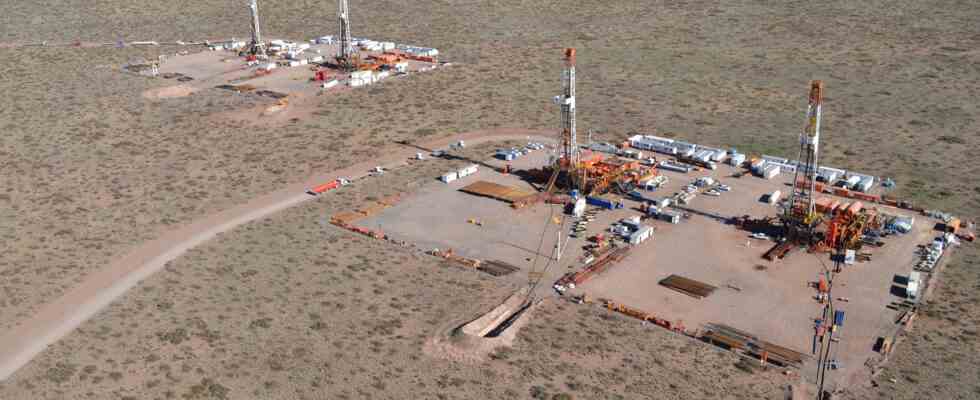Status: 03/25/2022 08:14 a.m
Brazil wants to boost its oil production because of the Ukraine war – at the request of the USA. Countries like Argentina would like to supply more gas. But how fast is that possible?
Just a few months ago, Bento Albuquerque, Brazil’s Minister of Mines and Energy, could hardly have imagined such an urgent request from the United States. When the price of Brent oil was still US$70 per barrel at the beginning of December, hardly anyone would have thought that three and a half months later the US government would ask for a rapid increase in Brazilian oil production.
Call from Washington
The production of Brazil’s offshore oil – from deep salt layers under the ocean – is comparatively expensive, which is why the South Americans have to rely on high oil prices for lucrative production. This has now skyrocketed to more than 100 US dollars per barrel during the Ukraine war. US President Biden also announced an oil embargo against Russia.
This is probably the main reason why US Energy Secretary Jennifer Granholm picked up the phone on March 10 to speak to her counterpart in Brasilia. Energy Secretary Albuquerque has been urged to rapidly ramp up oil production in Brazil.
The economic consequences of the Ukraine war – in addition to the increased prices at the gas stations – are now finally being felt in South America. In the case of crude oil, Brazil is also to step in to compensate for the lack of deliveries from Russia. Albuquerque has meanwhile complied with the request of his counterpart and announced that it will increase oil production. According to Brasilia, Brazil will support global efforts to increase fuel production.
Profitable business when oil prices are high
Specifically, Albuquerque wants to produce 7.3 percent more oil in 2022 than in the previous year. In the next ten years, production is expected to increase by 70 percent and reach 5.3 million barrels per day. According to Albuquerque, this has been agreed with the managing directors of the raw material groups operating in Brazil. They now want to bring forward planned production projects and thus produce more oil faster than previously targeted. As long as the oil price is high, mining off the Atlantic coast is profitable for the corporations.
Last year, around 1.2 million barrels went abroad every day, making Brazil the largest oil exporter in Latin America. The export volume should now increase because the hunger for fossil fuels in Europe and the USA is likely to increase in the long term due to the Ukraine war and the sanctions imposed.
Large shale gas deposits in northern Patagonia
Theoretically, Argentina could also benefit from this. So far, the country has only ranked 27th in the world in terms of natural gas production. But they have had ambitious plans on the Rio de la Plata for years. Argentina is estimated to have the second largest shale gas deposits in the world. Huge fracking projects are planned for development. Most of it rests in deposits in northern Patagonia. Politicians rely primarily on the Vaca Muerta extraction site.
Environmentalists, on the other hand, are critical of fracking gas production. They warn of the many billions of tons of CO2 that will be released in the process. These are enormous risks for the climate and the environment. But the new situation on the world energy market could turn the controversial project into a real beacon of hope.
The pipelines are missing
The only downside for the supporters of Vaca Muerta: Argentina has so far failed to build enough gas pipelines to ports with liquid gas terminals. This is the main reason why the funding cannot be increased overnight, criticize experts.
While there is no shortage of gas, the various governments have failed to pull together to move this energy infrastructure project forward. The various political camps disagree on what role the state should play in pipeline construction. In addition, the ongoing economic crisis has so far been a stumbling block for rapid expansion.
Bottlenecks at the refineries
Brazil also suffers from an infrastructure deficit: although the country produces large quantities of oil, it still imports more than 100,000 barrels a day from abroad. That’s because not all refineries in the country are designed for heavy oil, which is produced in Brazil. “We still have to import eight percent light oil to get the ideal blend for our refineries – both from a technical and an economic point of view,” says Rodrigo Leão, a researcher at the Federal University of Rio de Janeiro (UFJR).
So it will be some time before South America can do all it can to cover the newly created energy needs of the North. Here, too, no one really suspected how quickly the situation in Ukraine would escalate – and what that meant for global commodity trading.
Brazil/Argentina: New interest in South American oil and gas?
Anne Herrberg, ARD Rio de Janeiro, March 25, 2022 at 8:29 a.m

